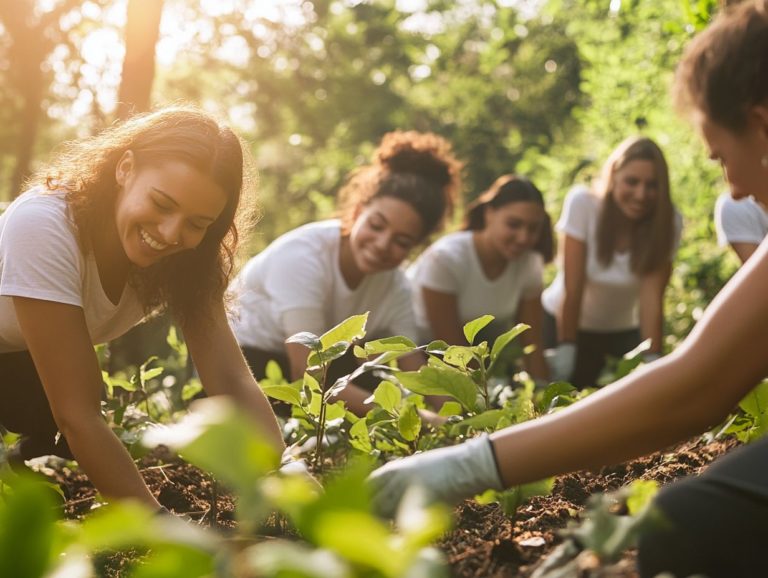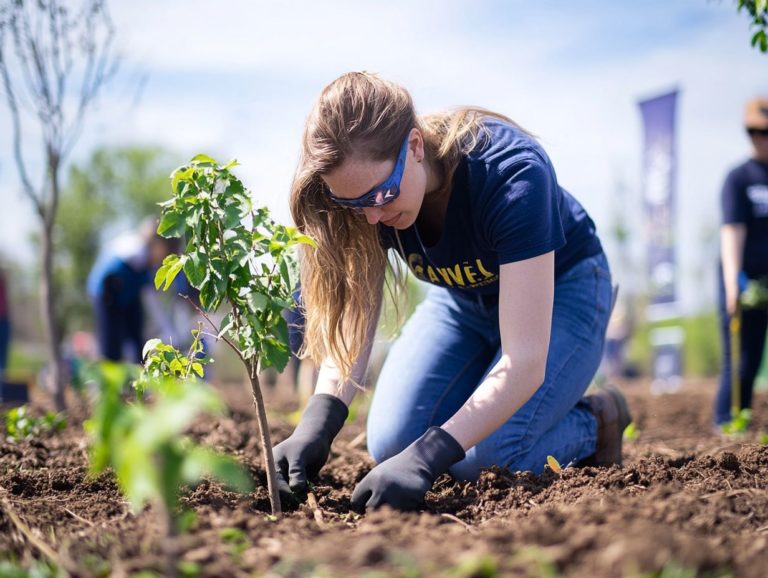5 Sustainable Cooking Classes Around the World
Cooking transcends mere sustenance; it serves as a bridge to culture, community, and the very essence of our planet.
When you find yourself in Italy, discovering the richness of local ingredients, or in Bali, honing your skills with plant-based recipes, sustainable cooking classes present an exceptional opportunity to embrace culinary traditions while fostering environmental awareness.
Take a moment to explore five extraordinary cooking classes worldwide, each offering its own unique approach and lasting benefits of sustainable cooking for both you and the planet.
Get ready to unleash your inner chef!
Contents
- Key Takeaways:
- 1. Learn to Cook with Local and Seasonal Ingredients in Italy
- 2. Discover Traditional Techniques in Thailand
- 3. Master the Art of Plant-Based Cooking in Bali
- 4. Experience Farm-to-Table Cooking in Costa Rica
- 5. Explore Indigenous Cuisine in Australia
- Curious About the Perks of Sustainable Cooking? Let s Explore!
- Frequently Asked Questions
- What is the concept of sustainable cooking?
- Why should I attend a sustainable cooking class?
- Where can I find sustainable cooking classes around the world?
- What are some examples of sustainable cooking classes around the world?
- How do I know if a cooking class is truly sustainable?
- What are the benefits of incorporating sustainable cooking into my daily life?
Key Takeaways:
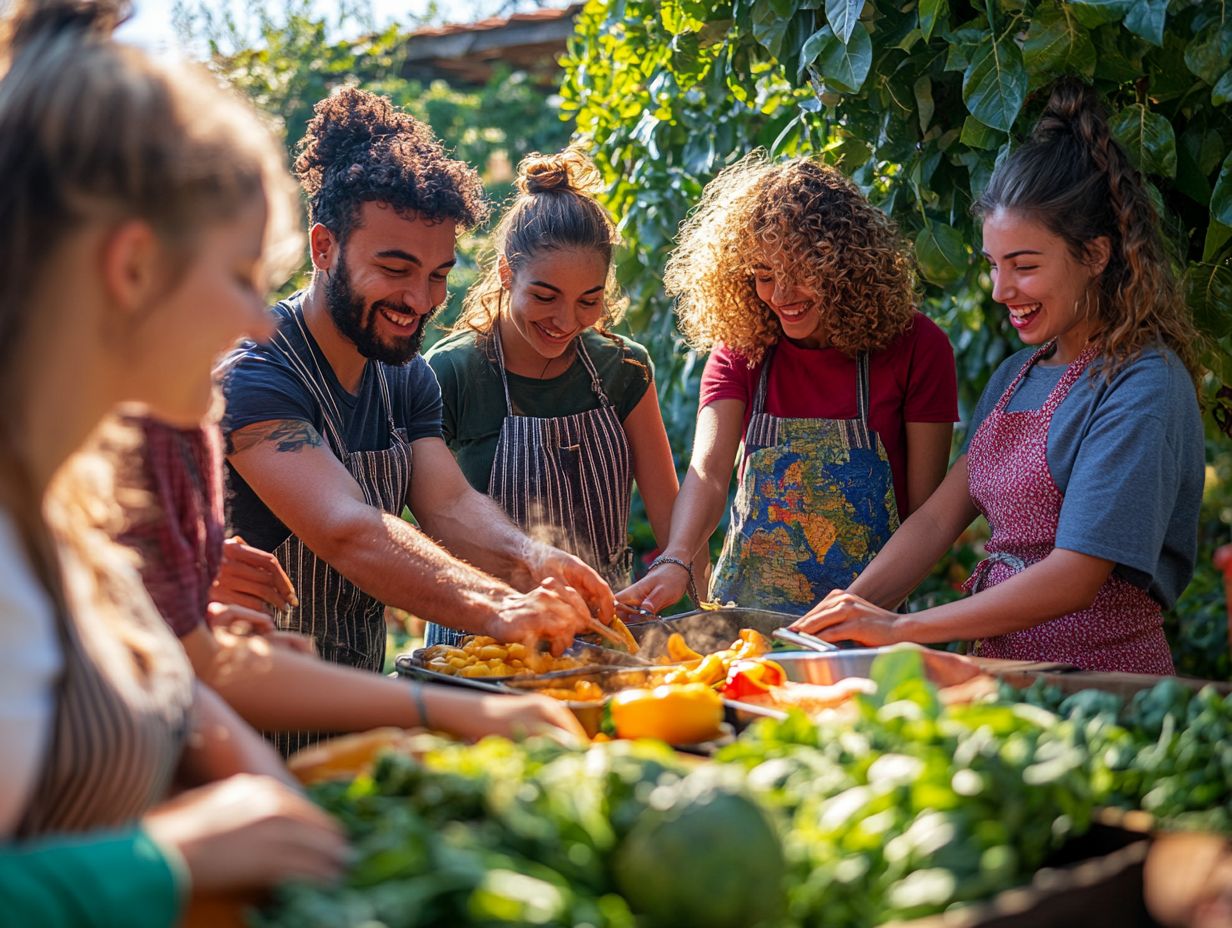
- Master the art of cooking with local, seasonal ingredients in Italy to support sustainable farming practices and reduce your carbon footprint.
- Discover traditional cooking techniques in Thailand that promote sustainability and conserve cultural heritage.
- Master the art of plant-based cooking in Bali to reduce your environmental impact and improve your personal health.
1. Learn to Cook with Local and Seasonal Ingredients in Italy
Embarking on a cooking journey in Italy invites you to explore the art of cooking with local and seasonal ingredients, enhancing your vegan culinary experience while immersing yourself in the rich traditions of this enchanting country.
As you make your way through regions like Emilia-Romagna, you ll indulge in the distinctive flavors of Balsamic vinegar and handcrafted chickpea pasta, perfect for a myriad of vegan dishes. Picture yourself in the coastal towns of Liguria, where the fragrant basil awaits you, ready to transform into a fresh, cheese-free pesto that embodies the very essence of Italy.
With a variety of cooking classes available both in-person and online, you can dive deep into these regional flavors, refining your cooking skills under the guidance of seasoned chefs. These classes also cultivate a sense of community, allowing you to exchange ideas and delve into sustainable sourcing particularly relevant in vegan cooking which enriches not only your dishes but also contributes positively to the planet’s health.
2. Discover Traditional Techniques in Thailand
Thailand presents a remarkable opportunity for you to immerse yourself in traditional cooking techniques tailored for vegan enthusiasts, allowing you to craft authentic plant-based dishes that honor local culinary traditions. Whether you’re eager to master the art of coconut curry or delve into the intricate world of Thai Spices, cooking classes in Thailand will reveal a variety of methods that elevate your cooking skills.
In these immersive experiences, you’ll learn to harness the vibrant flavors of fresh herbs like lemongrass, basil, and cilantro, all while exploring unique spices such as galangal (a root similar to ginger often used in Thai dishes) and turmeric (known for its earthy flavor and health benefits). From bustling street food stalls to refined professional kitchens, each class offers hands-on instruction, fostering creativity and encouraging you to experiment. For those preferring to learn from home, online options provide the perfect avenue to connect with skilled chefs right from your own kitchen.
You can easily adapt these techniques for plant-based diets, enriching the vegan culinary landscape and inviting even more individuals to indulge in the exquisite flavors of Thai cuisine.
Don t wait! Secure your spot in these extraordinary classes today!
3. Master the Art of Plant-Based Cooking in Bali
In the tropical paradise of Bali, dive into a cooking journey full of vibrant flavors and unique local ingredients. With fresh, local produce, Bali is the perfect place to learn innovative cooking techniques from experienced vegan chefs.
Explore various cooking classes to enjoy native ingredients like tempeh, coconut, and jackfruit in your dishes. These classes promote sustainability through locally sourced resources and encourage community engagement.
Enhance your culinary skills by learning about traditional Balinese cooking methods. Connect with the local culture and create lasting memories through a shared passion for food and sustainability.
4. Experience Farm-to-Table Cooking in Costa Rica
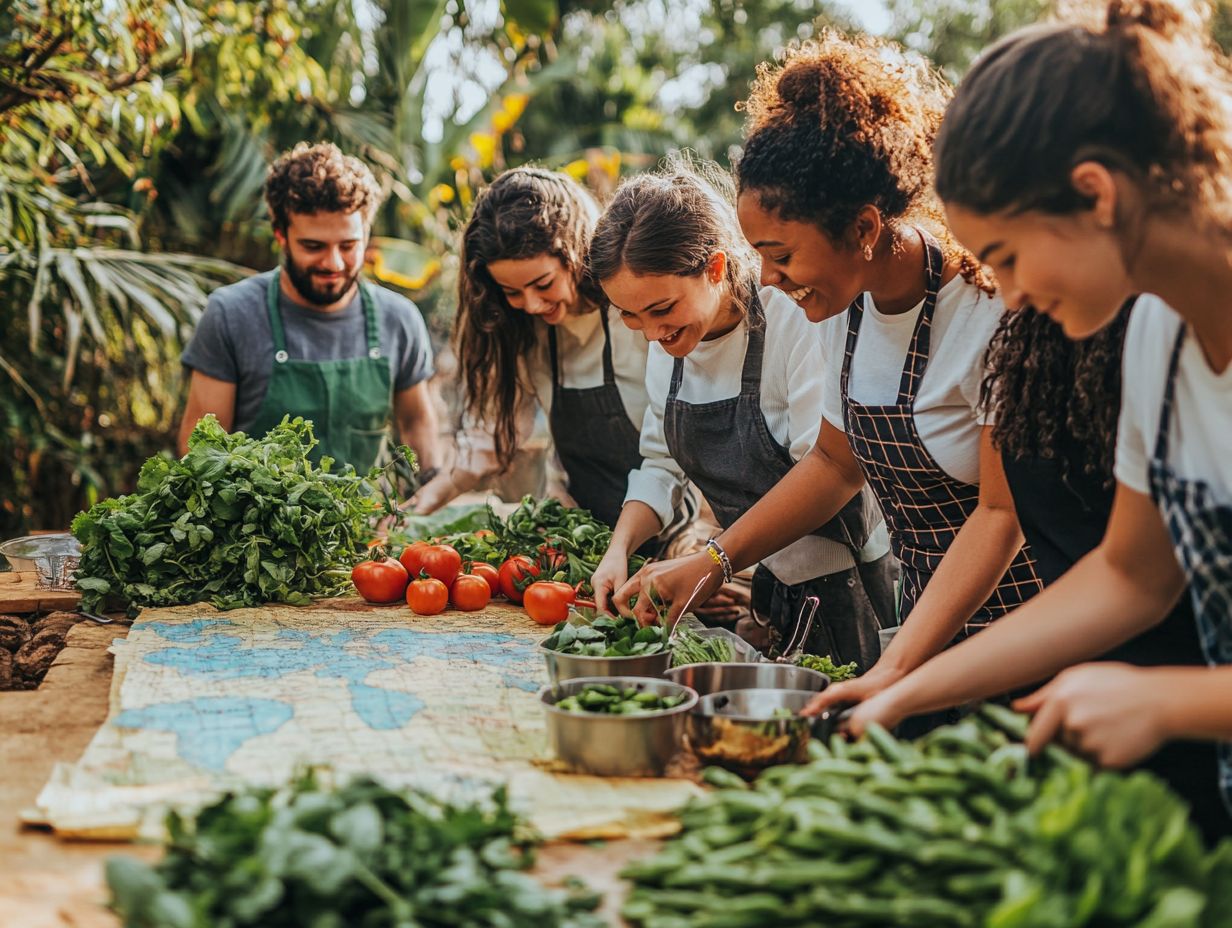
Costa Rica stands out for its commitment to sustainability. Here, you ll learn the principles of farm-to-table cooking using fresh local ingredients.
The farm-to-table movement supports local communities and promotes biodiversity. Visit eco-friendly farms and connect with passionate farmers who cultivate organic produce.
Join a cooking class for hands-on experience with seasonal fruits and vegetables. Creating flavorful, plant-based dishes enriches your culinary repertoire and helps you make conscientious choices at home.
5. Explore Indigenous Cuisine in Australia
Discover the indigenous cuisine of Australia. Join cooking classes focused on local ingredients and time-honored techniques to enhance your vegan cooking skills.
Learn from Indigenous chefs about unique ingredients like bush tomatoes and wattleseed. They share stories that connect these ingredients to the land, deepening your understanding of local ecosystems.
Embrace the sustainable practices in these cooking traditions. This experience will inspire you to commit to sustainability in your own cooking adventures.
Curious About the Perks of Sustainable Cooking? Let s Explore!
Attending a sustainable cooking class offers you many benefits that extend far beyond the kitchen, enriching your culinary journey and promoting a healthy living ethos. It also connects you with like-minded individuals in the vegan community.
By learning sustainable cooking practices, you enhance your culinary skills and gain a deeper understanding of the importance of sourcing ingredients responsibly and making conscious food choices.
These classes provide you with a platform to explore the richness of local produce, allowing you to cultivate an intimate knowledge of regional flavors and seasonal ingredients. You might find that this experience sharpens your cooking techniques and sparks a newfound creativity in the kitchen.
Embracing sustainable cooking habits significantly contributes to environmental conservation, as it helps reduce waste and carbon footprints. Beyond your personal growth, the communal aspect of these classes fosters lasting relationships, helping you build a network of passionate individuals who support one another in their journeys toward healthier, more sustainable eating practices.
What Are the Key Elements of Sustainable Cooking?
Key elements of sustainable cooking include utilizing local ingredients, adopting environmentally-friendly cooking methods, and emphasizing plant-based vegan cuisine meals primarily made from plants, such as fruits, vegetables, grains, and nuts that honors culinary traditions while promoting healthy eating. This approach encourages everyone, from chefs to home cooks, to reflect on the origins of your food, minimize waste, and make conscious choices that benefit your health and the planet.
By embracing seasonal eating, you can elevate the freshness of your dishes while supporting local farmers and reducing your carbon footprint, which refers to the total greenhouse gases emitted by our activities, tied to transportation. Incorporating practices like composting kitchen scraps and creatively using leftovers not only helps cut down on food waste but also encourages a more innovative approach to meal preparation.
Selecting organic ingredients ensures that your cooking process aligns with eco-friendly standards, steering clear of harmful pesticides. For anyone diving into vegan recipes, integrating these sustainable practices transforms your meals into not just nutritious options but also a culinary experience that embodies respect for the environment.
How Can Sustainable Cooking Help the Environment?
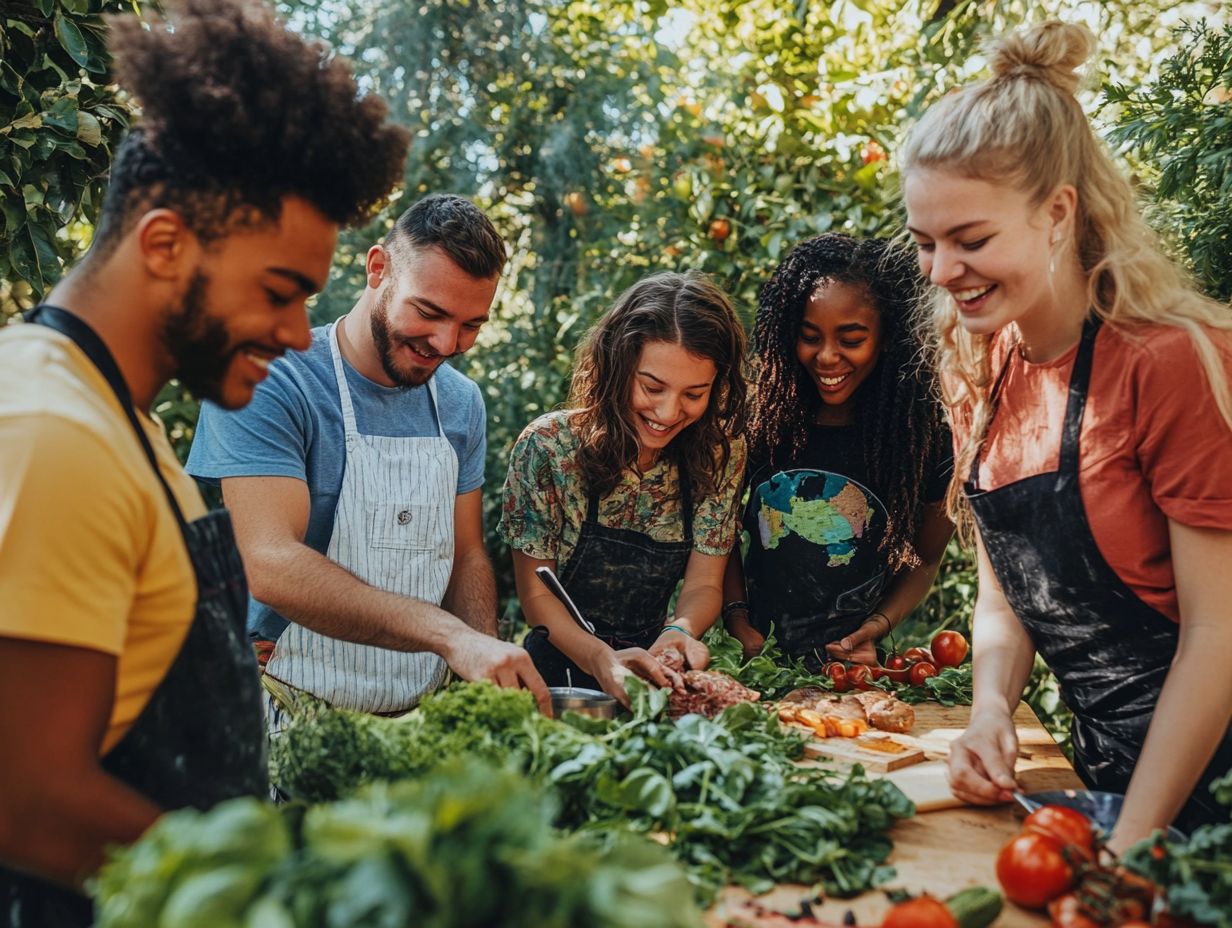
Sustainable cooking is pivotal in your quest to help the environment. By reducing carbon footprints, conserving local ecosystems, and promoting biodiversity through mindful food choices, you can truly make a difference. When you prioritize plant-based ingredients and responsible sourcing, you significantly mitigate the environmental impact of food production.
This approach minimizes food waste and bolsters local farmers who embrace organic practices, ensuring the freshness of your ingredients while cutting down on transportation emissions. For instance, when you whip up a meal using seasonal vegetables from nearby farmers’ markets, you create a dish with a much lower carbon footprint compared to one that relies on imported produce.
Embracing vegan cooking complements these sustainable principles beautifully, as it naturally lessens your reliance on resource-intensive animal agriculture. Simple steps, like meal planning to avoid overbuying and opting for whole foods instead of processed options, enable you to leave a positive mark in your kitchen. This nurtures biodiversity and contributes to a more resilient food system.
Don’t miss out on the chance to create dishes that are not just tasty but also good for the planet!
What Are Some Tips for Incorporating Sustainable Cooking into Everyday Life?
Incorporating sustainable cooking into your everyday life is entirely achievable with simple yet impactful tips. These tips help you create healthier meals, support local economies, and benefit the environment. By focusing on local ingredients, planning meals, and exploring vegan recipes, you can establish a sustainable cooking routine that aligns beautifully with healthy eating habits.
One effective strategy is to frequent farmers’ markets. Here, you’ll find fresh, seasonal produce that s often bursting with flavor compared to what you d find in stores. This practice not only boosts the local economy but encourages you to enjoy fruits and vegetables at their peak freshness.
Consider reducing your meat consumption by designating specific days for meals without meat. This opens the door to a world of creativity in the kitchen, allowing you to experiment with new ingredients and flavors.
By weaving these strategies into your daily cooking habits like planning meals around what s available locally you can cultivate a stronger connection to your food. Embrace a sustainable lifestyle that benefits both your well-being and the planet.
What Are Some Common Misconceptions About Sustainable Cooking?
Common misconceptions about sustainable cooking suggest that it s expensive, time-consuming, or lacking in flavor. You ll discover that vegan cooking is both fun and delicious!
Many people think sustainable cooking requires gourmet ingredients or complex techniques. However, with a bit of creativity, local ingredients can be transformed into flavorful and nutritious meals.
In reality, sustainable cooking can be budget-friendly and straightforward. It debunks the myth that it demands extensive culinary skills or pricey produce. For instance, a simple chickpea salad made with canned chickpeas, diced cucumbers, tomatoes, and a splash of lemon juice offers a nourishing meal that bursts with flavor and can be prepared in under 15 minutes.
A hearty lentil stew featuring lentils, carrots, and spices shows just how diverse and satisfying vegan dishes can be without straining your wallet. Choose whole foods and seasonal produce for tasty and healthy meals while promoting environmental sustainability.
How Can Sustainable Cooking Classes Benefit Local Communities?
Sustainable cooking classes offer a wealth of advantages for local communities. They create valuable connections among individuals, champion the use of local ingredients, and preserve the unique cooking traditions of the area. By participating in these classes, you refine your culinary skills while playing a vital role in boosting the local economy and promoting a healthier food culture.
These workshops often pave the way for exciting job opportunities across various sectors, from hospitality to agribusiness, enabling local residents to secure meaningful employment. By sourcing ingredients from nearby farmers, these classes invigorate local agriculture, ensuring that small-scale growers can thrive.
In communities where sustainable cooking classes have established themselves, inspiring success stories abound. One town, for instance, witnessed its farm-to-table restaurants thrive and its community gardens blossom, igniting a renewed appreciation for local foodways.
Participants frequently express a heightened sense of community and pride in their local heritage. This demonstrates how culinary education can serve as a powerful catalyst for positive environmental and social transformation.
Frequently Asked Questions
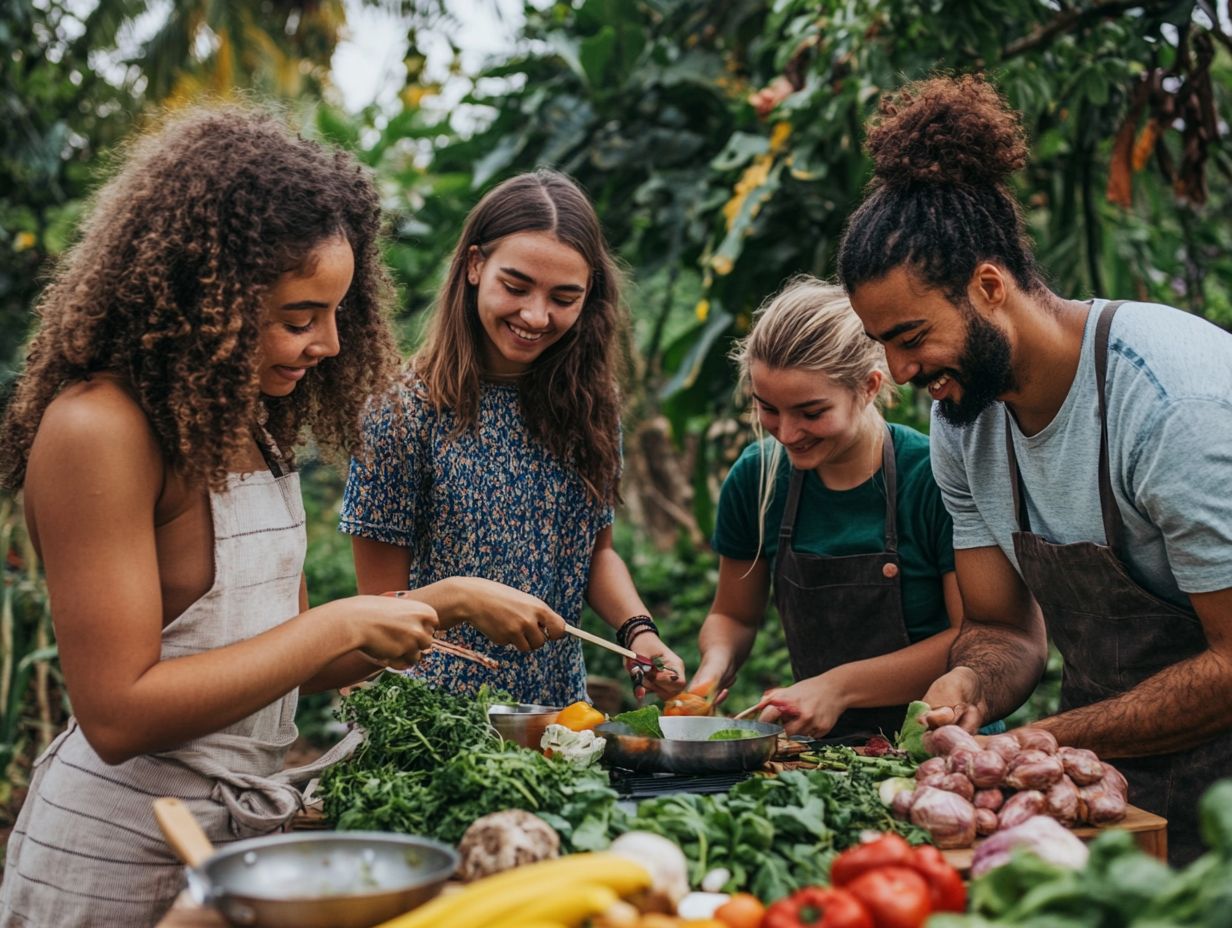
What is the concept of sustainable cooking?
Sustainable cooking is a way of preparing food that considers the environmental, social, and economic impacts of the ingredients and cooking methods used. It focuses on reducing waste, using locally sourced and organic ingredients, and minimizing energy consumption.
Start exploring local markets and unleash your creativity in the kitchen!
Why should I attend a sustainable cooking class?
Curious about sustainable cooking? Here s why you should dive into a class!
Attending a sustainable cooking class helps you make environmentally-friendly food choices. You can also learn to reduce your carbon footprint.
Where can I find sustainable cooking classes around the world?
You can find sustainable cooking classes in many places. Check local community centers, cooking schools, or online options.
What are some examples of sustainable cooking classes around the world?
Examples include classes focusing on plant-based cooking and zero-waste techniques. You can also find classes that use locally sourced ingredients and traditional methods.
How do I know if a cooking class is truly sustainable?
Make sure the class uses seasonal, locally sourced ingredients. Ask about their waste reduction and energy-efficient practices.
What are the benefits of incorporating sustainable cooking into my daily life?
Sustainable cooking offers many benefits. It reduces your environmental impact and saves you money by using fewer resources.
Don t miss out! Join a sustainable cooking class today and transform your kitchen habits for a better planet!


